Serendip is an independent site partnering with faculty at multiple colleges and universities around the world. Happy exploring!
Brain, Education, and Inquiry - Fall, 2010: Session 5

Session 5
Class is itself an experiment in a particular form of education: co-constructive inquiry
Learning by interacting, sharing observations and understandings to create, individually and collectively, new understandings and new questions that motivate new observations
Depends on co-constructive dialogue, being comfortable sharing existing understandings, both conscious and unconscious, in order to use them to construct new ones. Need diversity of understandings, need to be able to both speak and listen without fear of judgment. Need to see both self and others as always in process, always evolving
There is a discussion on msnbc right now that somewhat resembles our conversation last week in class. ... There is definitely no consensus among the audience on any of the topics, which is making the conversation incredibly rich ... Angela DiGioia
[Last week's] class seems to be a potential turning point in the semester. As a class, we aired frustrations, were introduced to a model of the brain (i.e. the nervous system), and we seemed to not get stuck on points as much as in previous classes. That is all very positive and exciting ... FinnWing
Recognizing and accepting that we have nothing to work with but ourselves and each other, our past experiences, our constructions from them, and the resulting dreams for the future, seems to me not only an adequate but an appealing place to work from (cf Writing Descartes and Fellow travelling with Richard Rorty). We may not ever get it "right," but we will always have open possibility in front of us and all the needed wherewithal to contribute meaningfully to shaping what comes next. Maybe that's the point of education? to enhance peoples' confidence in and abilities to contribute to shaping the future? Maybe "postmodernism" isn't the end state but rather a useful take-off point, allowing us to make better use of human diversity for conceiving and trying to implement possible futures? ... PG
Continuing from where we are: from last weeks forum
Is understanding the brain not just understanding people? ... FinnWing
Will the simple mastery of the brain truly drastically improve a teacher's effectiveness? ... D2B
I am surprised that more teachers do not have some knowledge of the biological side of the brain and the cyclical process that is constantly taking place in their students’ brains ...I am also wondering how so many teachers, without previous training as a biologist or neuroscientist, just “get it” ... the ones whose lesson plans and activities are able to stimulate each part of the brain to maximize the output produced (whatever that may be) and generate new inputs continuously ... Angela DiGioia
I don’t think that it is absolutely necessary for [all] teachers to know how the brain works formally because I think that sort of knowledge is best obtained through experience ...I think teachers who “get it”, get it from their daily and constant interaction with their students. While they are teaching, they are simultaneously learning and forming their own understanding of the dynamics of the classroom and how their students fit into it ... L Cubed
In a linguistics course I took last year, the teacher pointed out that although he knew a great deal about linguistics, he was not a better orator or interpreter of speech than anyone else - in fact, sometimes his knowledge hindered his abilities ... epeck
If teachers don't need to be scientists, then who, in the educational equation, needs to be? what if, perhaps, the STUDENTS were the scientists? perhaps a greater understanding of how our minds work, how we perceive information, and the diversity of ways that we are capable of learning would inspire kids are a young age to be involved with school, and discourage feeling of inferiority in the classroom. With a greater understanding and internalization of this fact, that we are all constantly students of the world, and that by just observing and participating our brains are literally growing, taking in information and exercising, inclusion in educational settings that often are stress inducing would be more rewarding ... simonec
The fact that the nervous system is capable of moving on its own is quite fascinating. I'm interested to find out more implications of this knowledge ... I'm curious whether there are "form-forming" parts of our brain? As noted by Gestalt psychologist and evident in our daily experience, we tend to see our sensual data in organized forms: shapes instead of linear elements and colors instead of pixels. ... LinKai_Jiang
anticipating a discussion to come
I don't think it's realistic to assume that just because we're seeing new patterns of brain activity [as a result of the computer age], that those are "bad" or deviate from some original norm. I'm not sure that there realistically is a norm to make reference to: hasn't the brain been evolving continuously, just as we have? Won't it continue to do so? ... bennett
If our brain is acting on the world as much as reacting to the world, we have less reason to feel like cogs in a deterministic machine ... [but] I wonder if anyone else was simultaneously a little awed and a lot repulsed by this pretty gruesome, science-fiction image of the brain in the jar... outputting, all by itself. I wouldn't ordinarily think of that activity as "acting" on the world. Little sparks are being emitted. And the brain runs some "tests" to see if those sparks have the anticipated effects... but that ... means always taking baby steps, and always playing catch-up. No room for boldness or vision there ... Because the brain isn't really asking questions... or if it is, it's not choosing what questions it wants to ask, or articulating those questions itself ... jessicacarizzo
I am still wondering where thoughts fit into the nervous system. I recognize that thoughts are internal and are therefore could be thought of as part of the more internal workings of the nervous system, but several ideas discussed in psychology lead me to think of ideas as an input, or at least as an output that then cycles back and is an input (like how moving your arm may be output, but seeing it and feeling it move is input). Once we are aware of a thought, isn't it input? ... Basically, I'm unclear on how to distinguish input and output. The more I think about it, the less I am able to distinguish the two ... epeck
|
Implications for education (to date):
- Stop presenting understandings as "right," "definitive"; present instead as foundation for developing new understandings?
- Diversity in classrooms an asset rather than a problem?
- Ability to see things in multiple ways a virtue, a desired result of education?
- Inquiry skill is present at birth, rather than dependent on maturation/education (How Babies Think)
- ????
Adding to our model/story of the brain
Brain not a stimulus response machine
Harvard Law of Animal Behavior
"Under carefully controlled experimental circumstances, an animal will behave as it damned well pleases"
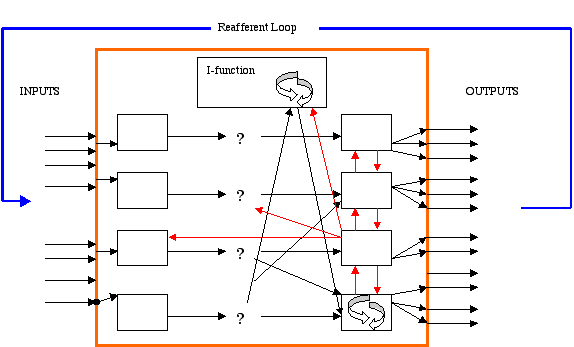
Notice loop, comparison of expectation and input, as per loopy science/inquiry
Connect to "creativity," willingness/ability to try things out, to do things without knowing exactly what will happen, to take risks, is inherent in leeches, frogs, humans (unless ... )
Finding all this and more in physical structure of the nervous system
Neurons and their interconnected organization
Sensory neurons, motoneurons, interneurons
All signals are action potentials
Neuronal integration, excitation, inhibition, spontaneity (see The need to entertain the inconceivable and looping)
Boxes and cables


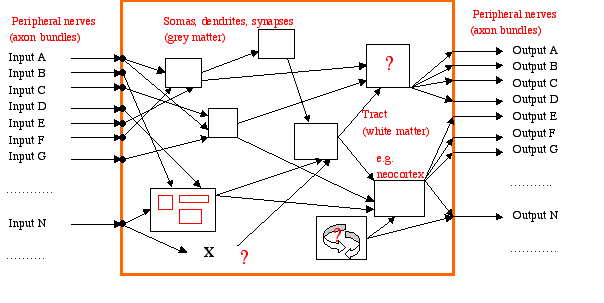
Individual variation (more) and continual variation - remember neocortex
Topographic organization: the brain as a distributed system
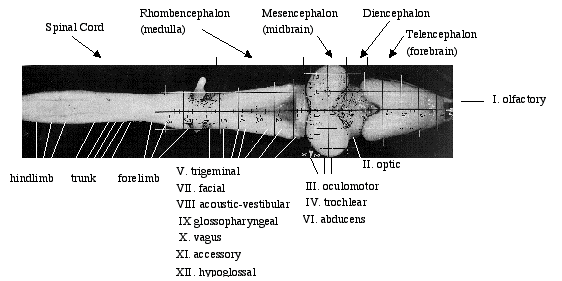
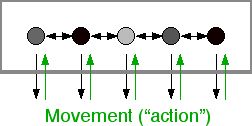
More on distributed systems, simulation, relevance to education
Beginnings of sensation/perception: pattern of action potentials in sensory neurons; action: patterns of action potentials in motoneuron; thinking: patterns of action potentials in interneurons
The bipartite brain
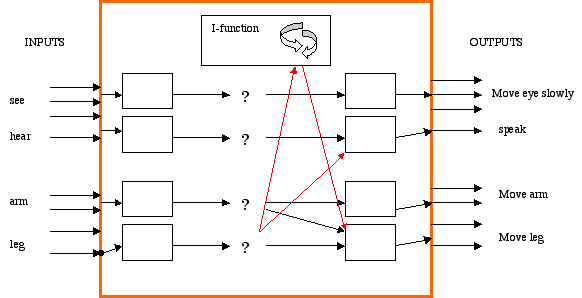
Relevance for thinking about constructedness of world but also of self: pain, phantom limb pain
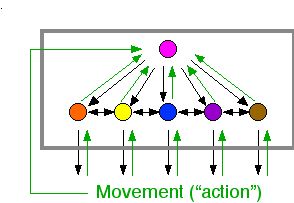
More on bipartite brain
Blindsight, dissociative fugue, skilled athletic performance
Dreaming, sleep walking, locked in syndrome
Interactions of cognitive unconscious (Marvin Minsky, Society of Mind) and story teller
Thoughts, feelings, aspirations not parallel to cognitive unconscious but rather derived from it
Emotion, intuition not distinct from thought but a part of it (Antonio Damasio, Descartes' Error)
Internal co-constructive dialogue/inquiry as well as external
Internal conflicts, added capabilities: to conceive beyond experience
Paul Bloom, First Personal Plural (see also It take all kinds to make a brain)
Implications for education?
Your continuing thoughts about diversity, distributed systems, bipartite brain in the forum below ....

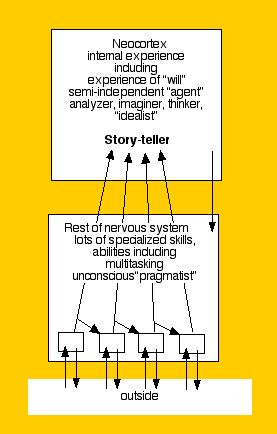


Comments
A reoccurring theme
Looking through my notes from class over the last few weeks, there seems to be a reoccurring theme--how does that happen??!! I have a difficult time grasping how neurons are able to communicate so quickly (how quickly, I wonder) and with such precision. There is not a moment when there is not some sort of sensory input that the brain has to process so what happens in the case of Christopher Reeves, for example, to the neurons that are below where he severed his spinal cord? Is there no way for them to communicate with the neurons above, even if it's in a round-about way? One other comment in my notes was regarding how pain or sensation is felt and perceived. How does the brain know that touching a pan in a hot oven causes someone to feel pain? Feelings intrigue me as they do not seem so cut and dry, and shape who our "selves" are/is and how we change with time and experience. Is there a genetic aspect to this development?
The Self
I was surprised the article didn’t address biologically based predispositions and personality traits, self views, other people’s perceptions of us, the roles we play in society, work, family, friends, and school. All of these factors as well as our beliefs and values, body image, routines and memories all play important roles in our persona and our concept of self. They do not necessarily fight for control or plot against each other or lead to multiple selves. These variables combined could suggest a single “uncompleted” self with multiple interconnected internal components brought out in different situations over time based on our predispositions (eliciting a combination of nature and nurture).
I see us as having situational roles/identities more so than selves, as selves don’t represent who we truly “are.” Multiple selves are more fitting for classifying multiple personality disorders or other mental illnesses (in which each generated self is unique and independent, unable to transfer memories, experiences and the like to a separate self). Situational roles would perhaps better embrace personal experiences, temporary mood sates, traits, achievements etc. which would contribute to certain actions, reactions, responses and motivations, desires and ideas given specific environmental situations.
Personality and traits are constantly developing at younger ages and into adulthood. However, there comes a point where change is not needed and stability and consistency become a larger predictor of behavior across situations, alluding to less internal conflict with more narrowed generalities about who we are and how we act.
Some questions that came to mind after reading the article: Are there also cultural differences that influence our view of self? (Perhaps highlighting “one” self vs “multiple” selves?) Is it the brain's constructions that we see ourselves as having multiple counterparts whether they are in harmony or conflict? Or is it an on-going social construction? Can we reduce these multiple selves to just an active and reflexive “self”?
Alright, so I have to share
Alright, so I have to share with you all two very interesting things with ramifications for education that I learned in personality psych this week. the first is about entity vs. incremental theorists, terms that refer to an individual's attitude to their own personality and intelligence. Most of the research in this area comes from Carol Dweck. While, like everything else, it's a continuum, basically entity theorists see their characteristics as more set and unalterable, factors out of their control. Incremental theorists, on the other hand, see themselves as able to change and improve due to their own efforts, see themselves as more malleable due to their own volition and behaviors. It has surprised me consistantly during this psych class how much of personality psychology is value judgments; I came into the class expecting more objective analyses of how we are different, but frequently it seems research indicates certain characteristics to be far preferable to others. It is like that with these theories- studies indicate that incremental theorists are both happier and more successful. While, curiously, there is no research that proves that incremental theorists actually *do* change more, simply the belief that it is possible leads them to work harder, take more pride in their accomplishments, and to be inspired to greater heights rather than discouraged by failure. (reminds me of what we said about which is more valuable in empirical experiments- success or failure.) They maintain self-esteem better and seek out challenges. All just the sort of qualities desirable for inquisitive and engaged students.
These different attitudes prove to be primable, both in the short-term and in the long-term. In studies, having participants read articles insisting upon either the inherent stability of traits or the personality as changeable provokes the behavior of the corresponding mind-set. In the long-term, and here's where it gets truly interesting, the sort of praise you give children affects how they grow up to see their lives. According to Dweck, you should always stress that achievements and generally positive behavior stem not from inherent qualities in the child but from their efforts to work hard/do the right thing. "Your paper was really good, it is clear you worked very hard on it" rather than "you did really well; you're very smart and gifted with words." Children grow up feeling more responsible for their own success, and inspired to continue to work towards goals. I was skeptical for awhile during class, but by the end I found all the research very compelling. There's a lot more out there.
The other thing had to do even more directly with the question brought up in class of how much knowing about the workings of the brain can help teachers and students. More research from Dweck found, interestingly, higher levels of achievement from those students who *were* taught about how their brain learns, strenghthening synapses as it gathers and retains information and connections. One student in my psych class said she'd actually had a teacher in elementary who'd stressed brain function in learning with positive results. Her motto had been "alright, let's build some dendrites today." Apparently there's something to it. :)
i think that this idea, of
i think that this idea, of multiple selves, is really easy to apply in terms of artists. you can often hear contemporary performers talk about their stage self and real self.
Beyonce calls herself "Sasha Fierce" on stage. SF is her diva-fied self, who she has created in order to allow herself to fully be engaged with with sexy and over-the-top stage persona. I think that my different simones are my own creation, as the stage, home, and classroom simone are conscious creations that i have established in order to try to be as successful as possible in diffrerent situations.
What do you do with all your selves?
I found the article “ First Person Plural” really interesting. The article suggests that what makes people happy depends on what makes a person “them”; in other words their self. And then the idea of multiple selves is introduced. This, I feel, is consistent with post-modernist ideology. I very much like the idea of there being multiple selves and not having to choose one of them to be “me”. However, like other similar post-modernist ideas, it sounds great in theory but might not be applicable practically. Yes, in theory its great to be able to be more than a self, but practically, what do you do with that? Assuming that some of these parts will be in conflict with each other, how do you live your life? How do make decisions? Maybe that’s why multiple personality is considered a disorder. This can also be generalized for multiple selves to multiple realities/worlds. How do we feel about that? Do we see some inherent truth in it but disregard it because in the world and society we’ve constructed, it just wouldn’t work? Moreover, what implications does that have for education. If we let go of the idea of there being one self, then what does education do?
multiple selves
I feel like the article is somewhat correct in suggesting that there are various ‘selves’ that do compete which each other at times. However, I also feel like it may not necessarily apply to everyone. For someone, the various selves may never compete or come into conflict with each other but for someone else, these contradictions may make up their identity. So, to some extent, it depends on the particular environment or circumstances.
this was supposed to be in
this was supposed to be in response to the first post, sorry!
Creativity and Surprise
On Monday we talked about how, given the same situation, a frog responds differently. Similarly, us humans are able to surprise ourselves by taking new courses in seemingly old situations. One example that I liked a lot was Michael Jordan. So I watched an MJ video. What really impressed me, was his amazing ability to react so well in so many situations. He was so talented and open to new situations that he really could do anything it seemed. Like do a 180 degree turn in the air, face away from the basket and shoot. It often would go in, and despite his look of surprise it also seems like he had some idea it would go in often times.
I bring this up to preface another idea: that we are constantly changing people from one moment to the next and possibly as a result respond differently to different situations. We may have patterned activities, but that we are able to go outside of them is reassuring as it means that there is really creativity and surprise to be had.
MJ video for anyone interested:
http://www.youtube.com/watch?v=2eDNlE61kwY
Mistaken double post
...Anyone know how to delete?
The Death of Liberal Arts
This article titled "The Death of Liberal Arts" points to the sad economic reality that many liberal arts schools have to cut down on their course offerings to focus on providing more "useful" pre-professional preparations for the students. But in the long run a liberal arts education, especially from an elite school, fares quite well, as the ability to adapt to different environments and to learn to solve new problems quickly and effectively is desirable not only for its own sake but also for the sake of employability. Usefulness and education for education's sake do not have to contradict.
http://www.newsweek.com/blogs/jobbed/2010/04/05/the-death-of-liberal-arts.html?obref=obnetwork
I definitely relate to your
I definitely relate to your dismay. I think that (potentially as a result of, if not definitely as a result of) we have been accustomed for too long to being uncritical about some of the key concepts that determine how people accord value to things. Why is growth always a good thing (in the sense of "economic growth" for instance)? We're already pushing up against the limits of our environment to sustain us at the level we're abusing it. Whom are "useful" degrees useful to? Is making money really sufficient as a reason to do something (like the way that we define policy, for instance)?
The liberal arts college is one of the last bastions, I think, of a way of thinking about the world that is reflective: which encourages people to think in a way that may be against the dominant mores of their society, and indeed sanctions difference as not only acceptable but desirable. It's only through this kind of consistent reflectiveness that we have any hope of even surviving as a species; we're poisoning our water and our air so that electricity can be cheap, so we can drive where we want when we want to, etc. It is my sincere hope that there's a future for literally thinking about the world: not just assuming that things are a particular way, or that our values are in the right place, and the liberal arts college is one of the necessary breeding grounds for that kind of attitude, I think (which says a lot about the educational system in the US today, and probably a fair amount about our brains, too...).
Another
Another Perspective
http://www.newsweek.com/2010/04/05/the-case-for-a-useless-degree.html
This article is definitely worth a read as it suggests that even today, a liberal arts degree is very useful.
Thinking of the essence of a
Thinking of the essence of a person in terms of their nervous system is an idea I would like to pursue more...
When we were discussing the "Christopher Reeves example" I was sure someone would object and present the option of the mind/essence of someone not necessarily being contained within the nervous system - but surprisingly nobody did. On second thought, maybe as we keep going further up the nervous system and not "locating" Christopher Reeves, we'll have to give the mind/body question more thought. We discussed the idea of mind/body dualism a bit in the beginning of the course (I think), but I think it may really come into play as we further discuss the nervous system/brain. I wonder if there would be a difference in education if we were to approach students as minds rather than brains, or vice versa...do you have to understand the brain to understand the mind, or the mind to understand the brain?
A clinical approach to education/the brain/mind could improve education, or be completely ineffective. I really am not sure which way it will go, although I think some intrinsic understanding of the mind always helps.
creativity...
So I found this interesting article that speaks about the necessity of creativity and the necessary approaches to tap into it. Its interesting to read what methods are suggested. This goes along with our discussion of teachers and whether or not they need to know the brain to tap into their students and just "know" the best ways to facilitate and engage.
I found the following statement particularly intriguing: :Rena Subotnik, a researcher with the American Psychological Association, has studied children’s progression into adult creative careers. Kids do best when they are allowed to develop deep passions and pursue them wholeheartedly—at the expense of well-roundedness. “Kids who have deep identification with a field have better discipline and handle setbacks better,” she noted. By contrast, kids given superficial exposure to many activities don’t have the same centeredness to overcome periods of difficulty. "
I find it interesting that a student must develop deep passion and pursue theses passions wholeheartedly at the expense of well-roundedness. Does this suggest that well-roundedness falls short of being a characteristic needed to engage in and move up within creative careers? If so, what does that say about what defines "adult creative careers"? What is lost in the process or 'missing' within a student pursuing his/her deep passions?
Please do read this article: http://www.newsweek.com/2010/07/12/forget-brainstorming.html
I don't think a deep focused
I don't think a deep focused passion is incompatible with well-roundedness. If one's passion is food, there are many ways of connecting the world to the theme. History of food, politics of food, aesthetics of food, cooking of food, philosophy of food...etc. Through studying food from different perspectives, one learns various ways of making sense of one single subject. This is a form of creativity in its own right. Different perspectives will also reveal the human creativity in organizing our material world. I took "deep passion" to be a central lens through which one sees the world.
my self NOT my selves???
"Each of us is a community of competing selves, with the happiness of one often causing the misery of the another"..."We benefit, intellectually and personally, from the interplay between different selves, from the balance between long-term contemplation and short-term impulse...the community of selves shouldn't be a democracy, but it shouldn't be a dictatorship, either." -(The Creativity Crisis)
Definition of SELF (merriam webster dictionary)
This article is so frustrating...I feel that my characteristics, moods, emotions, conscience, motivations, and what not are not competing with each other as separate entities; but complimenting each other in some way or another, and very connected, unable to be set apart or disconnected.
Did anyone else read the article? Perhaps I just don't like the language of it.
selves
This article actually describes my experience of reality pretty well. "Self," as the dictionary definition you pulled shows, is kind of a bad/confusing word to use, I think, because it's a word that describes the umbrella that shelters all these unruly, competing desires, many of which don't seem sophisticated enough to be called "selves" themselves. Still, it seems right to say that we are each more a plurality than a central authority on guard against distracting, id-identified intruding impulses. What do other people think? Think about how we feel when we screw something up. I don't often have the experience of being able to identify a kind of Sunday-schoolish sense of right and wrong when faced with a decision, or even a sense of having done the "wrong" thing within the narrow context of my own life. Our decisions always feel like good ideas to our dominant "selves" at the time. I think the author has a kind of mania for categorization that overcomplicates what he's trying to say though. I don't identify with "cursing the lazy bastard who didn't set the coffee timer the night before," because since it's all us, I think we'll treat all of our selves with infinite compassion and understanding, whether we really deserve it or not. That's what holds us together as a single coherent personality. I think we can think of ourselves as a bundle of competing desires without adopting Sybil as a model of consciousness (awesomely bad movie I highly recommend). It might be healthier to just let our concept of self become a little more capacious. When I "regret" something, I'm not blaming someone else. I'm ashamed if it's serious, or if it's a silly, minor, transgression maybe I'm amused, kind of humbled to realize that, yes, there's some impetuosity in my personality as well. It seems bizarre to want to call all of these different impulses "selves," though, as if there's always the impetuous one over here and always the reflective one over here. And I agree with you, Emily, that the "selves" are intimately connected, set up to help each other out, balance one another, or sometimes in a sort of self-sabotaging structure, but always in a more complicated relationship than just competing.
Selves
I was also a little frustrated by this article. I feel like if we have so many "selves" then we would have no consistent personality and instead our actions would be all over the place. I do think we have different motivations and these motivations may influence what part of our personality is the most apparent at one point in time. In this sense, there might be multiple selves. I wouldn't go so far as to divide up our being to the same extent that the author of this article did, but I can see where they are coming from. Perhaps people are more like social chameleons that interact differently based on the social context that find themselves in. Each situation is going to merit different reactions and interactions and because of that one aspect of our overall personality might come out, but I dont think that necessarily means that we have different selves.
Understanding Selves
I understand your frustration. It could be that they(our emotions, motivations, characteristics, ect) are separate entities that strongly influence and often overlap one another. They are so inseparable, interconnected, interdependent that it becomes difficult to distinguish which "self" is the source of a particular action, feeling, desire, motivation, ect. All of these "selves" could influence one action or a series of actions which makes it appear as if they are one when in it actuality they are in some ways very distinct. I particularly like the third definition of self. Just a note: I do not necessarily agree with the claims or ideas presented in the article, these are just thoughts.
I thought it was interesting how the article discussed the debated question "How can I be happy?" and the difficulty in defining "I". It made me think, regardless of the fact that happy can have multiple meanings, what exactly is being made happy?
Thinking about education in relation to the discussion presented in this article, the first thing that came when I searched a definition was:
Education in the largest sense is any act or experience that has a formative effect on the mind, character or physical ability of an individual. In its technical sense, education is the process by which society deliberately transmits its accumulated knowledge, skills and values from one generation to another.
Is education the medium by which we establish and develop our "selves"?
Post new comment